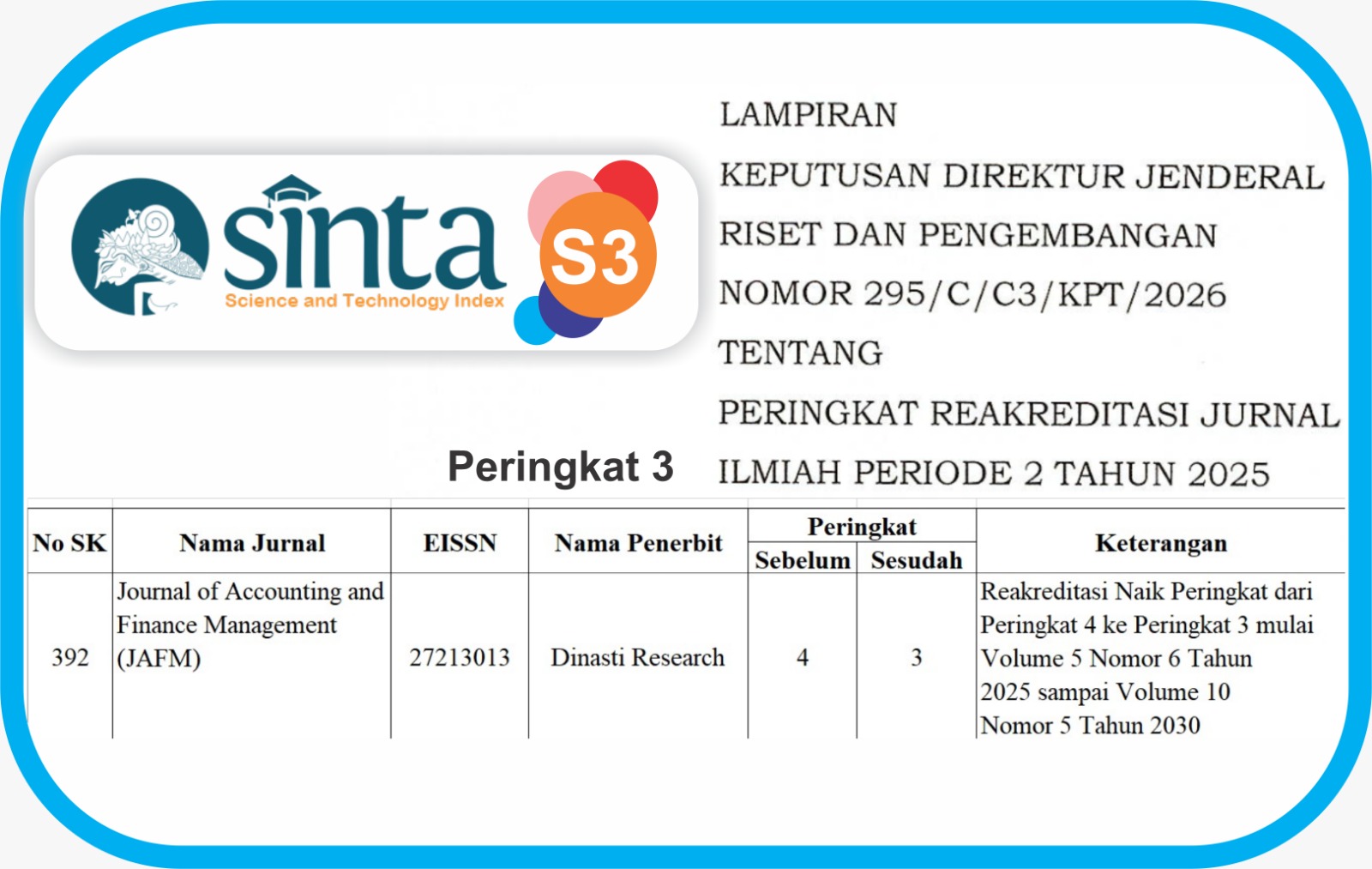Analysis Impact Knowledge Of Blockchain Towards Fraud Detection Skill Throught Readiness Technology As Intervening Variable
DOI:
https://doi.org/10.38035/jafm.v5i3.618Keywords:
tecknology, knowledge of blockchain, fraud detection skills, readiness technologyAbstract
This study aims to analyze the impact of knowledge of Blockchain on the ability to detect fraud, with technology readiness serving as an intervening variable. The research employs a quantitative approach, gathering data from auditor. The findings indicate a positive relationship between knowledge of Blockchain and fraud detection capabilities. Moreover, the readiness of technology significantly mediates this relationship, suggesting that higher levels of technology readiness enhance the positive effects of Blockchain on fraud detection. These results highlight the importance of both technical knowledge and readiness to adopt new technologies in improving fraud detection processes.
References
Aboud, Ahmed, and Barry Robinson. 2022. “Fraudulent Financial Reporting and Data Analytics: An Explanatory Study from Ireland.” Accounting Research Journal 35 (1): 21–36. https://doi.org/10.1108/ARJ-04-2020-0079.
ACFE Indonesia Chapter. (2020). SURVEI FRAUD INDONESIA YANG DISAJIKAN DALAM DATA REPORT TO THE NATIONS TAHUN 2019. Acfe-Indonesia.or.Id, 2507(February), 1–9.
Alghamdi, Sultan, Tugrul Daim, and Saeed Alzahrani. 2024. “Organizational Readiness Assessment for Fraud Detection and Prevention: Case of Airlines Sector and Electronic Payment.” IEEE Transactions on Engineering Management.
Alshurafat, Hashem, Mohannad Obeid Al Shbail, and Ebrahim Mansour. 2021. “Strengths and Weaknesses of Forensic Accounting: An Implication on the Socio-Economic Development.” Journal of Business and Socio-Economic Development 1 (2): 135–48. https://doi.org/10.1108/jbsed-03-2021-0026.
Behl, Abhishek, Nirma Sadamali Jayawardena, Vijay Pereira, and Brinda Sampat. 2024. “Assessing Retailer Readiness to Use Blockchain Technology to Improve Supply Chain Performance.” Journal of Enterprise Information Management 37 (2): 673–97. https://doi.org/10.1108/JEIM-07-2022-0242.
Benedetti, H., Nikbakht, E., Sarkar, S., & Spieler, A. C. (2020). Blockchain and corporate fraud. Journal of Financial Crime, 28(3), 702–721. https://doi.org/10.1108/JFC-09-2020-0187
cnbcindonesia.com. (2023). 4 Bank Bangkrut di RI Tahun Ini, Semua Karena Fraud. 4–7.
Juma’h, A. H., & Li, Y. (2023). The effects of auditors’ knowledge, professional skepticism, and perceived adequacy of accounting standards on their intention to use blockchain. International Journal of Accounting Information Systems, 51(August). https://doi.org/10.1016/j.accinf.2023.100650
Gohil, Dhruman, and Shivangi Viral Thakker. 2021. “Blockchain-Integrated Technologies for Solving Supply Chain Challenges.” Modern Supply Chain Research and Applications 3 (2): 78–97. https://doi.org/10.1108/mscra-10-2020-0028.
Halbouni, Sawsan Saadi, Nada Obeid, and Abeer Garbou. 2016. “Corporate Governance and Information Technology in Fraud Prevention and Detection: Evidence from the UAE.” Managerial Auditing Journal 31 (6–7): 589–628. https://doi.org/10.1108/MAJ-02-2015-1163.
Khalil, Muhammad Mohsin, and Waqar Ahmed. 2024. “Analyzing the Drivers of Blockchain Adoption for Supply Chain in Pakistan.” Journal of Science and Technology Policy Management. https://doi.org/10.1108/JSTPM-10-2023-0178.
Marks, Jonathan. 2012. “The Mind Behind the Fraudsters Crime: Key Behavioral and Environmental Elements.” United States of America: Crowe Horwath LLP, 1–62. https://www.fraudconference.com/uploadedFiles/Fraud_Conference/Content/Course-Materials/presentations/23rd/ppt/10C-Jonathan-Marks.pdf.
Mer, A., Singhal, K., & Virdi, A. S. (2024). A Review of the Role of Artificial Intelligence in Banking and Stock Market Trading. Finance Analytics in Business, June, 175–198. https://doi.org/10.1108/978-1-83753-572-920241009
Natour, Abdul Rahman Al, Hamzah Al-Mawali, Hala Zaidan, and Yasmeen Hany Zaky Said. 2023. “The Role of Forensic Accounting Skills in Fraud Detection and the Moderating Effect of CAATTs Application: Evidence from Egypt.” Journal of Financial Reporting and Accounting. https://doi.org/10.1108/JFRA-05-2023-0279.
Oyerogba, Ezekiel Oluwagbemiga. 2021. “Forensic Auditing Mechanism and Fraud Detection: The Case of Nigerian Public Sector.” Journal of Accounting in Emerging Economies 11 (5): 752–75. https://doi.org/10.1108/JAEE-04-2020-0072.
philsoophian, Maryam, Peyman Akhavan, and Morteza Namvar. 2022. “The Mediating Role of Blockchain Technology in Improvement of Knowledge Sharing for Supply Chain Management.” Management Decision 60 (3): 784–805. https://doi.org/10.1108/MD-08-2020-1122.
Roszkowska, P. (2021). Fintech in financial reporting and audit for fraud prevention and safeguarding equity investments. Journal of Accounting and Organizational Change, 17(2), 164–196. https://doi.org/10.1108/JAOC-09-2019-0098.
R., Vedapradha, and Hariharan Ravi. 2021. “Innovation in Banking: Fusion of Artificial Intelligence and Blockchain.” Asia Pacific Journal of Innovation and Entrepreneurship 15 (1): 51–61. https://doi.org/10.1108/apjie-09-2020-0142.
Tang, Jiali, and Khondkar E. Karim. 2019. “Financial Fraud Detection and Big Data Analytics – Implications on Auditors’ Use of Fraud Brainstorming Session.”
Vousinas, Georgios L. 2019. “Advancing Theory of Fraud: The S.C.O.R.E. Model.” Journal of Financial Crime 26 (1): 372–81. https://doi.org/10.1108/JFC-12-2017-0128.
Wijayanti, Dwi Marlina, Yayu Putri Senjani, and Wilda Farah. 2024. “The Role of Machiavellian Personality, Altruistic Personality, Religiosity, Whistleblowing System, and Accounting Firm Size in Mitigating Fraud Intention.” Journal of Financial Crime 31 (1): 119–34. https://doi.org/10.1108/JFC-02-2023-0034.
Downloads
Published
How to Cite
Issue
Section
License
Copyright (c) 2024 Rizky Ananda, Harti Budi Yanti

This work is licensed under a Creative Commons Attribution 4.0 International License.
Authors who publish their manuscripts in this journal agree to the following conditions:
- The copyright on each article belongs to the author(s).
- The author acknowledges that the Journal of Accounting and Finance Management (JAFM) has the right to be the first to publish with a Creative Commons Attribution 4.0 International license (Attribution 4.0 International (CC BY 4.0).
- Authors can submit articles separately, arrange for the non-exclusive distribution of manuscripts that have been published in this journal into other versions (e.g., sent to the author's institutional repository, publication into books, etc.), by acknowledging that the manuscript has been published for the first time in the Journal of Accounting and Finance Management (JAFM).



























